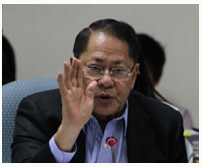MANILA, Philippines—Former Sen. Edgardo Angara insisted on Tuesday, he did not personally benefit from the P300-million fund from the Agricultural Competitiveness Enhancement Fund (ACEF).
Contrary to news reports, Angara said the fund financed a road project that fast-tracked travel between Aurora and Manila, a mariculture park and a coconut-based products complex in his home province.
In a statement, Angara said P200 million was allocated for the improvement of the 120-kilometer Baler-Casiguran Road, which he said had cut travel time between the northern towns of Dinalungan, Casiguran and Dilasag, and the rest of the province.
And while it has not been fully completed, it has fast-tracked land travel in the three northern towns of Aurora, Central Luzon and Manila, he said.
Some residents of Nueva Vizcaya, Quirino and Isabela have begun using the road as an alternate, and faster route to Manila, he added.
Angara explained that the P200-million ACEF grant kick-started the Baler-Casiguran road project, and prompted the national government and foreigners to provide funding, too.
Angara said the remaining P100 million was used to fund two projects—Aurora Mariculture Park and a Coconut-Based Products Complex—now being implemented by the Aurora State College of Technology.
The two projects would be completed by 2016, he said.
“The three projects that the P300-million ACEF disbursement funded belie any and all insinuations that I personally benefited from the funds,” he said.
The ACEF was created as a safety net for farmers and fishermen affected by the trade liberalization policies of the government.
Documents obtained by the Inquirer showed that Angara and then Palawan Rep. Abraham Mitra channeled a combined P410.27 million in ACEF money to their respective provinces.
Mitra pushed for the construction of a P10.2-million abaca farm in Palawan State University in 2008 and another P100 million for the eradication of pests in his province in 2009 by the Department of Agriculture (DA).
Both Angara and Mitra said the projects should be classified as grants, and not lumped together with the P4.388 billion in arrears that the Commission on Audit claimed in its 2012 annual financial report that the DA had yet to collect from more than 250 companies.
This constitutes 80 percent nonpayment of the P5.38 billion released under ACEF before it was suspended by the Aquino administration in 2011.
RELATED STORIES
2 lawmakers gained from farm subsidies
Coops confirm kickbacks asked to get Acef loans
‘Ghost’ borrowers got P2.5B from Acef —Drilon
